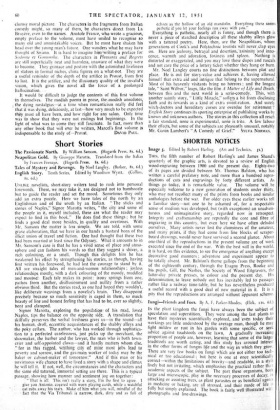Short Stories
UNLIKE novelists, short-story writers tend to rush into personal forewords. These, we may take it, are designed not to bamboozle but to guide the reader and set the mood. Sometimes they only add an extra puzzle. Here we have tales of the north by an Englishman and of the south by an Italian. "The sticks and stones of Naples," Signor Marotta writes, "the city and some of the people in it, myself included, these are what the reader may expect to find in this book." He does find these things ; but he finds a good deal more besides, in quality and overtones. With Mr. Sansom the matter is less simple. We are told, with some grave elaboration, that we have in our hands a bastard born of the illicit union of travel and fiction. One had thought that these two had been married at least since the Odyssey. What it amounts to in Mr. Sansom's case is that he has a vivid sense of place and atmo- sphere and can fashion his words so that they suggest a shiver, a rich colouring, or a smell. Though this delights him he has weakened his effect by strengthening his stories, as though, having first written his foreword, he had lost the courage to stand by it. All are straight tales of men-and-women relationships: joyless relationships mostly, with a dark colouring of the moody, muddled and morose. Each tale makes its point: irony springs from one, pathos from another, disillusionment and nullity from a rather obvious third. But the stories read, as one had hoped they wouldn't, like deliberate weavings from a novelist's brain. They disappoint precisely because so much sensitivity is caged in them, so much beauty of line and honest feeling that has had to be, ever so slightly, bent and clamped.
Signor Marotta, exploring the population of his mad, loved Naples, tips the balance on the opposite side. A translation that skilfully preserves the verbal freshness gives us—in the round—all his human, droll, eccentric acquaintances of the shabby alleys and the poky cellars. The author, who has worked through sophistica- tion to a perfected carelessness, just picks up the merchant, the shoemaker, the barber and the lawyer, the man who is both town- crier and self-appointed clown—and it hardly matters whom else, "for in this ragged, writhing city Of mine most jobs lead to poverty and sorrow, and the gas-main worker of today may be the baker or cabinet-maker of tomorrow." And if this man or his unvirtuous wife chance to have lived a story with a shape and climax he will tell it. If not, well, the circumstances and the characters and the same old tattered, immortal setting are there. This is a typical passage, showing how manner and sentiment jog on together: "That is all. This isn't really a story. I'm the first to agree. I • give you Antonio, coyered with worn playing cards, while a watchful cat.rubs away his teats. Make of him what you will, mindful of the
• fact that the Via Tribunali is narrow, dark, dirty and as full of
echoes as the hollow of an old mandolin. Everything there seems pathetic if you let your feelings run away with you."
Everything is pathetic, nearly all is funny, and though there is never a piece of starched description all these shabby alleys glow with a tattered poetry. Here, then, are the Neapolitans, whom generations of Cook's and Polytechnic tourists will never.clap eyes on. Here are jealousy, betrayal and desertion,-asininity and inno- cence, warmth and adoration, foxiness and spleen. Nothing i, distorted or exaggerated, and you may love these dupes and rascal, and not care the price of a lottery ticket whether they hang or burn Mr. Noel Langley courts no fine distinctions between plot and place. He is out for story-value and achieves it, having allowed himself that extra aid and intrigue that belong to the supernatural Most of his heavenly visitants bring no horrors: and the longest tale, " Saint Wilbur," leaps, like the film A Matter of Life and Death between this and the next world in a serio-comedy. This, with another saintly story, "Little Miracle," suffers a bit from disclosing faith and its rewards as a kind of extra sweet-ration. And surd) witch-doctors and hereditary curses are overdue for retirement'? English Story continues its sporting enterprise of publishing works b■ known ahd unknown authors. The stories in this collection all reach a fair standard, none is experimental, none is trite. A few labour their effects, but some of the subjects are pleasantly unusual, notably Mr. Gavin Lambert's "A Comedy of Grief." SYLVA NORMAN.


































 Previous page
Previous page